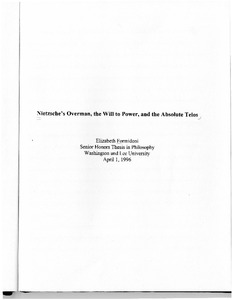| dc.rights.license | In Copyright | en_US |
| dc.creator | Formidoni, Elizabeth Marlyn | |
| dc.date.accessioned | 2023-10-20T17:40:56Z | |
| dc.date.available | 2023-10-20T17:40:56Z | |
| dc.date.created | 1996 | |
| dc.identifier | WLURG038_Formidoni_thesis_1996 | |
| dc.identifier.uri | https://dspace.wlu.edu/handle/11021/36413 | |
| dc.description.abstract | Nietzsche focuses on the idea of the ideal individual as an underlying and vital theme in all of his writing. He examines the question of how man should live his life in this world. His answer encompasses his critique of moral systems, his declaration that God is dead, his revaluation of values, and his eventual presentation of the individual and the overman, in conjunction with the will to power and the eternal return of the same. Although many fail to detect a common theme in the writings of Nietzsche, all of his work is a projection of how a life ought to be lived, and how the ideal individual would regard living in this world. The study of the ideal individual must begin with an examination of the background forces which he believes control man's existence and lower him to weakness and common status. From these depths, a higher being arises; an individual who is driven from within. What is it that drives such a man? How does Nietzsche, using the ideas of the will to power and the eternal return, conceive of an individual who can exist in the face of the fact that God is dead? Nietzsche presents the will to power as the idea of continuous selfovercoming, a never ending search that exists both internally and externally for the individual. This will to power is the motivating force for such a man. What, then, is this
man striving for? [From introductory section] | en_US |
| dc.format.extent | 40 pages | en_US |
| dc.language.iso | en_US | en_US |
| dc.rights | This material is made available for use in research, teaching, and private study, pursuant to U.S. Copyright law. The user assumes full responsibility for any use of the materials, including but not limited to, infringement of copyright and publication rights of reproduced materials. Any materials used should be fully credited with the source. | en_US |
| dc.rights.uri | http://rightsstatements.org/vocab/InC/1.0/ | en_US |
| dc.subject.other | Washington and Lee University -- Honors in Philosophy | en_US |
| dc.title | Nietzsche's Overman, the Will to Power, and the Absolute Telos | en_US |
| dc.type | Text | en_US |
| dcterms.isPartOf | WLURG038 - Student Papers | en_US |
| dc.rights.holder | Formidoni, Elizabeth Marlyn | en_US |
| dc.subject.fast | Nietzsche, Friedrich Wilhelm, 1844-1900 | en_US |
| dc.subject.fast | Kierkegaard, S�ren, 1813-1855 | en_US |
| dc.subject.fast | Criticism, interpretation, etc. | en_US |
| local.department | Philosophy | en_US |
